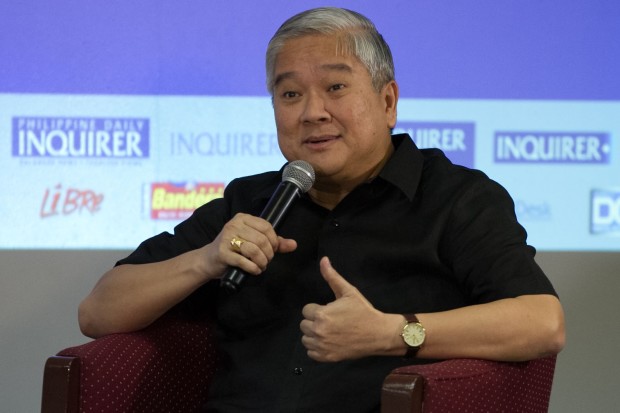
Lingayen-Dagupan Archbishkop Socrates Villegas appears at the PDI Office for the Meet the Inquirer Forum on Feb. 13, 2017. INQUIRER PHOTO/ ALEXIS CORPUZ
MANILA — “You cannot solve the problem of drugs which kills people, by killing people who kill people.”
This was the reminder of Lingayen-Dagupan Archbishop Socrates Villegas on Monday, in reiterating the Catholic Church’s firm stand against extra-judicial killings in the war on drugs.
“We are not saying the drug problem is not serious, it is serious and it must be solved,” he said at the Meet Inquirer Multimedia forum on Monday afternoon.
The president of the Catholic Bishops Conference of the Philippines added: “But killing will not solve it. It will just create a culture of revenge, a culture of disregard for the rights of human beings.”
Villegas was the guest at the forum, where he was grilled on the CBCP’s position on extra-judicial killings and the revival of the death penalty amid President Duterte’s war against illegal drugs.
The CBCP president stressed that the problem of illegal drugs could not be solved by killing people, as the real solution would lie in offering alternatives to address poverty.
He added that the drug problem has been a symptom of the bigger problem of poverty, which he stressed has been both an economic problem and a problem of values.
“If you give them jobs, improve the education and values system, we may no longer need to solve drug abuse by holding it by the horns but by giving them alternatives,” Villegas said.
He cited the Church’s Fazenda Esperanza, a farm in Masbate catering to former drug dependents, and a drug rehabilitation center in Bulacan run by Catholic lay people.
“When you speak of Church-sponsored drug rehabilitation, don’t just focus on board members with priests and bishops in there. The Church is also lay, religious, bishops and priests together,” he said.
It may be recalled that more than a week after its January plenary assembly, the CBCP finally made a collective stand on the issue and issued a pastoral statement denouncing extra-judicial killings.
The Church has been criticized for being silent on the issue of extra-judicial killings in the past seven months of the Duterte administration.
Villegas pointed out that bishops, on their own, have made their own statements on the issue and that the Archdiocese of Lingayen-Dagupan held a Mass for the souls of the victims killed as early as September 2016.
“I’m not defending my brother bishops, but what I am saying is we have not been quiet… Fortunately or unfortunately, it is not covered by media or social media but we have been doing our work on the ground,” he said.
The prelate pointed out that their immediate concern for the families of the victims has been to condole, reach out and give them consolation in their moment of grief.
He added that in Pangasinan, he has been visiting the wakes of victims without any media covering him or any announcement, adding that they have been attending to the victims on a personal basis.
“We might get lost in the statistics and forget that the families and victims have faces. We might forget. They are not just statistics. Let us not just make a protest against the killings using the 7,000 killed as our base,” Villegas said.
More than 7,000 suspected drug personalities have been killed in police operations and summary executions since July following Duterte’s assumption of office.
Villegas pointed out that all Filipinos should ask what we should be doing as a nation to address the issue of extra-judicial killings.
“If we throw the problem of the killings on one person, a group of persons or an institution, it is bound to fail. It it will take 100 million Filipinos coming together to solve this problem,” he said.
He added that the CBCP’s pastoral letter on extra-judicial killings was not intended to bring down Malacañang or President Duterte.
“We wanted to treat the issue of killings as a moral issue,” Villegas said, noting that the pastoral letter did not even mention the President.
He admitted that he expected Malacañang and the other sectors of society to perceive the pastoral letter as their “contribution to a perceived social problem in the country.”
“It was our contribution. We are saying, we your bishops see the situation as this, and if you share this conviction, these are the things that we must do together,” the prelate said.
More important than strong words from a pastoral letter, Villegas said, would be the “concerted unified action from God-loving people.”
“Don’t focus too much on the strength or the strong words that pastoral letters may contain. After a while they are bound to be forgotten, but actions of compassion, justice, and truth are longer lasting, and that is the bigger statement,” he said.
He added that the CBCP’s appeal was not addressed to the government, but to its flock and the people of God.
“We had hoped that sectors of society would act on it together on the killings, in the hope that the government would listen to direction that the people are taking. But even if the government does not act on it, we are hoping that people of God would act on it positively,” Villegas said. SFM
RELATED VIDEO